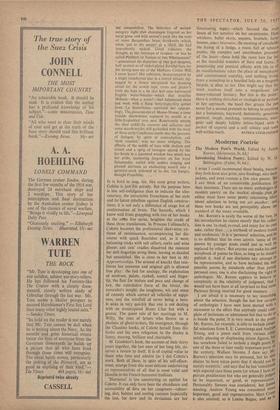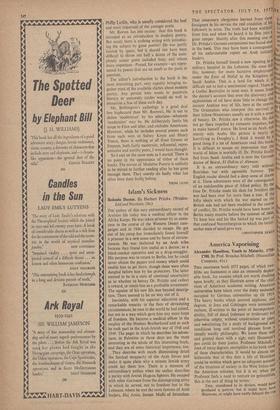Moderne Poetrie
The Modern Poet's World. Edited by James Reeves. (Hcinmann, 8s. 6d.) I wisit I could recommend these books, because they both have nice print, nice bindings, nice dust' jackets, and even contain a few nice poems. Bat I can think of no conceivable justification for, their existence. There are so many anthologies ot modern poetry on the market already that 00 editor must have some pretty interesting ideas about ,selection to bring out yet another: and these two books are not perceptibly above the standard of the many available. Mr. Reeves's is easily the worse of the two. la his introduction he claims merely that his collet:" Lion is one 'to read, re-read, and enjoy for its ow° sake, rather than ... a textbook of modern trends and tendencies.' It is a 'personal' selection, and he i3 so diffident that he even admits 'some of the poems by younger poets could just as well he replaced by others.' But anyone can make his owa scrapbook of poems he likes, so long as he doesn't publish it. And if one disclaims any attempt t° be representative, and to have included the best possible poems by standards other than purclY personal ones, one is also disclaiming the right 10 anthologise. Mr. Reeves appears to believe s° completely in the relativity of judgment, that would not have been at all surprised to find sonle Patience Strong inserted for good measure. I am afraid it is necessary to say something about the selection, though the last few reviews of anthologies I have seen have started with 3 statement to the effect that anybody could coin' plain of inclusions or admissions but that to do se , is beside the point. It is very much to the point' Mr. Reeves, for example, is able to include ',loll' ful selections from E. E. Cumminngs and Andrew Young, and a poem each from various other, mildly pleasing or displeasing minor figures, his' has somehow failed to include a single poem bYf one of the three or four really important poets .° the century, Wallace Stevens. I dare say Reeves's selection may be personal, but he als° claims `to have taken pains that it should not haed merely eccentric,' and says that he has `consider with especial care those poets for whom I have nt'd private predilection but who are generally judge , to be important, or good, or representative; Presumably Stevens was considered, but foun! wanting. Andrew Young was considered fl011". important, good and representative. Hart Con` is also omitted; so is Louise Bogan; and so Is
Philip Larkin, who is usually considered the best and most important of the younger poets.
Mr. Reeves has one excuse: that this book is intended as an introduction to modern poetry. But surely there is nothing wrong with introduc- ing the subject by good poems? He was partly limited by space, but it should not have been difficult to throw out half a dozen of the com- pletely minor poets included here; and others more important—Pound, for example—are repre- sented by poems that are an insult to the poets in question.
The editor's introduction to the book is the most interesting part, very capably bringing to- gether most of the available clichés about modern poetry. Any person who wants to penetrate literary or university circles would do well to memorise a few of these each day.
Mr. Bebbington's anthology is a good deal less haphazard than Mr. Reeves's. He is out to define 'modernism' by his selection—whatever 'modernism' may be. He deliberately limits his scope to Eliot and after, and excludes Americans. However, while he includes several poems each from such wets as Sidney Keyes and Henry Treece, there is nothing at all from Graves or Empson, both fairly modernist, influential, repre- sentative and worthy poets, I would have thought.
So I end on the same note as I started. There is no point in the appearance of either of these books. The novice of Moderne Poetrie is unlikely to be stirred to further reading after he has gone through them. They merely do badly what has often been done badly before.
THOM GUNN































 Previous page
Previous page